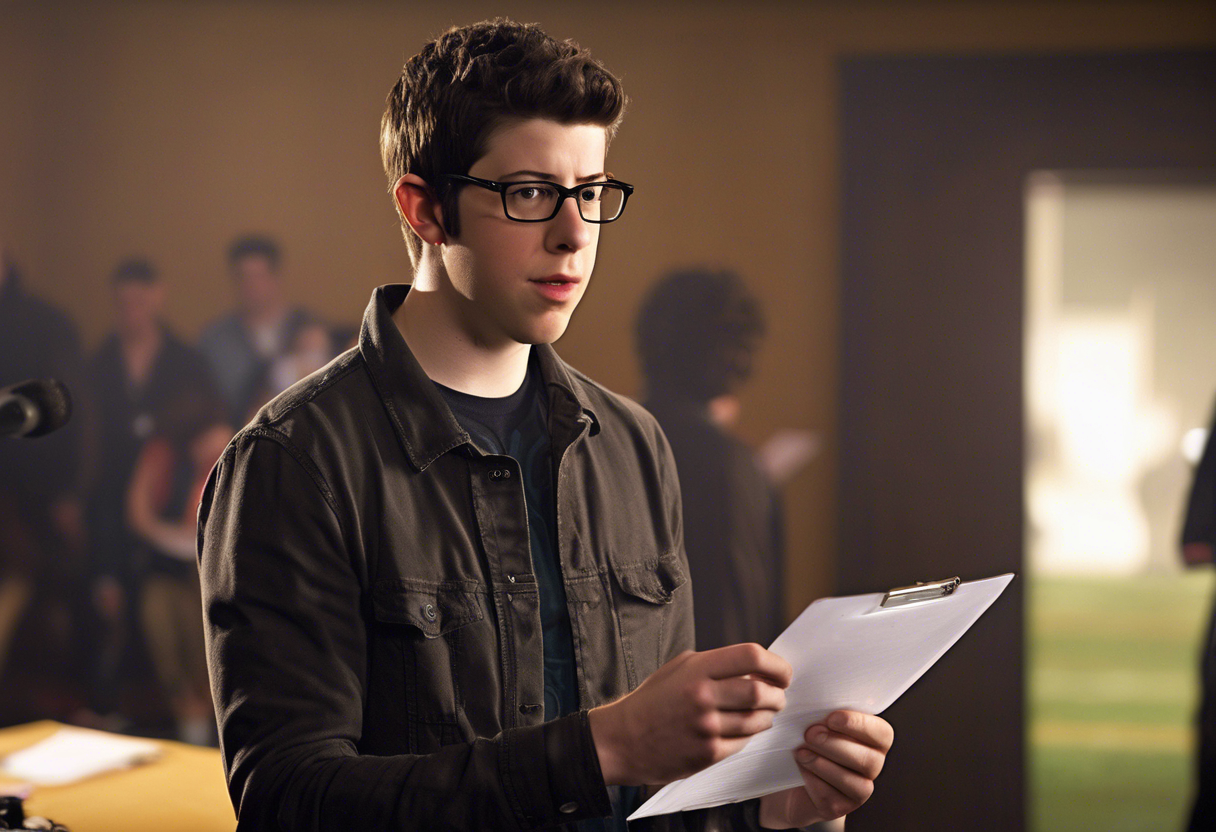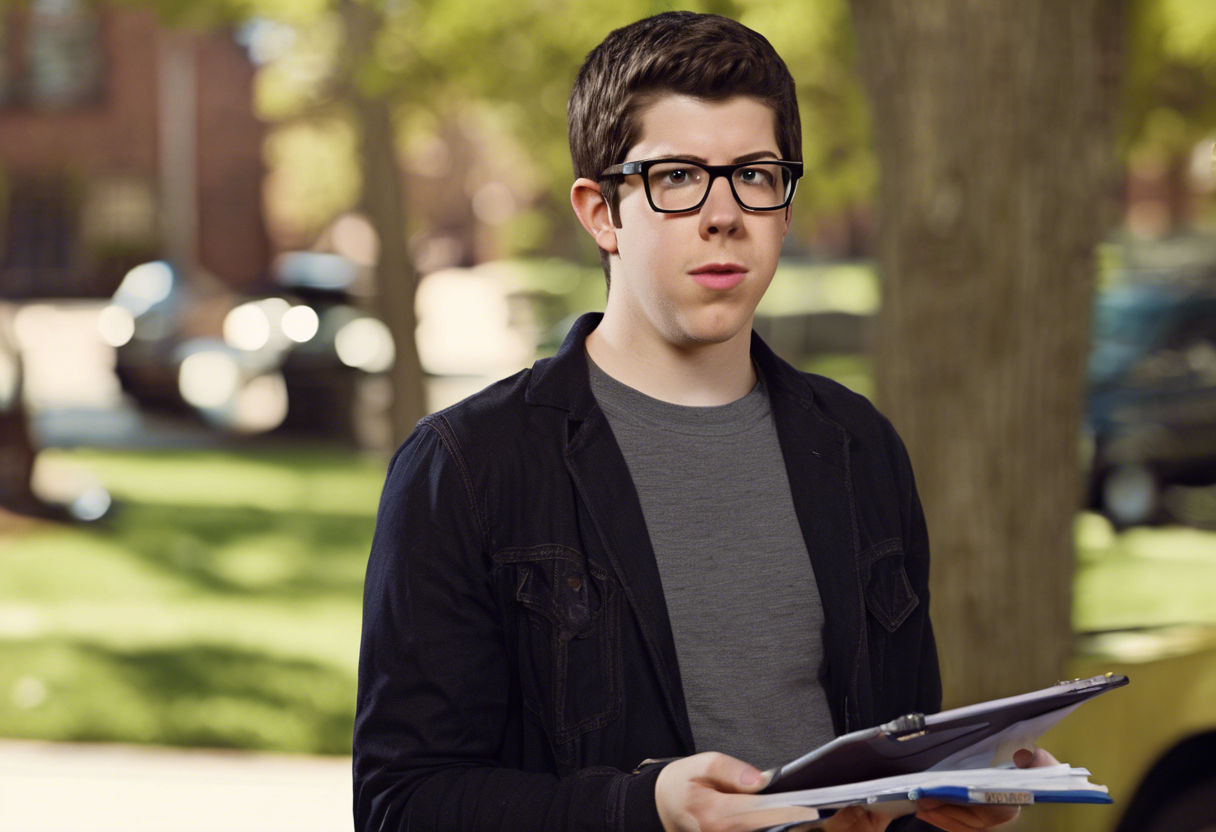Contents
Tommy from Pitch Perfect
Introduction
Tommy, played by Christopher Mintz-Plasse, is a significant character in the 2012 musical comedy film Pitch Perfect, directed by Jason Moore and written by Kay Cannon. Created as a part of the film’s ensemble cast, Tommy is not a main character but plays a crucial role in the narrative, particularly during the a cappella auditions. He is portrayed as a confident and somewhat eccentric student who oversees the auditions for the university’s a cappella groups.
Tommy’s backstory is not extensively explored in the film, but his defining traits are evident through his interactions and monologues. He is depicted as a passionate and dedicated individual within the a cappella community, having experienced various hardships and rejections, yet remaining committed to his love for a cappella music [1][4].
Role in the Story
Tommy’s role in the story is primarily centered around the a cappella auditions at Barden University. He is responsible for organizing and conducting these auditions, ensuring that potential members are aware of the expectations and the competitive nature of the groups. During the auditions, Tommy delivers several monologues that set the tone for the intensity and seriousness of the a cappella world, distinguishing it from high school-level performances [1][4].
Tommy’s interactions are mostly with his sidekick, Justin, who is described as "tone-deaf" and provides a comedic contrast to Tommy’s enthusiasm. Their dynamic highlights Tommy’s leadership and Justin’s loyalty, despite his inability to sing. Tommy’s journey is not deeply personal but serves to advance the plot by introducing new characters and setting the stage for the competitions that follow.
Tommy’s relationships with other characters are limited but significant. He interacts with the main characters, such as Beca and the other Bellas, during the auditions, and his character helps to underscore the challenges and pressures faced by these groups. The key events and conflicts Tommy is involved in are mainly related to the auditions and the initial formation of the a cappella groups [1][3].
Character Analysis
Tommy’s personality is marked by his confidence, passion, and somewhat eccentric behavior. He is a leader who commands attention and respect, even if it is through his unconventional methods. His motivations are rooted in his love for a cappella music and his desire to maintain the high standards of the university’s groups.
One of Tommy’s strengths is his ability to inspire and intimidate potential members, which is evident in his monologues and interactions. However, his flaws include a somewhat abrasive demeanor and a tendency to belittle those who do not meet his expectations. Despite these flaws, Tommy’s character is compelling because he represents the dedication and intensity required to succeed in competitive a cappella.
Tommy’s development throughout the film is minimal, as he is more of a supporting character. However, his presence helps to shape the narrative by emphasizing the competitive and serious nature of the a cappella world. This makes him relatable to audiences who appreciate the passion and commitment required in such competitive environments [1][4].
Themes and Symbolism
Tommy embodies several themes that are central to the movie. One of the primary themes is the importance of dedication and hard work. Through his character, the film highlights the intensity and commitment required to succeed in competitive a cappella. Tommy’s experiences, such as being rejected by the Army and facing other hardships, symbolize the resilience and perseverance needed to achieve success in this field.
Another theme Tommy represents is the transition from high school to real life. His monologues often distinguish between the casual, social aspects of high school singing groups and the serious, competitive nature of university-level a cappella. This theme is crucial as it sets the stage for the main characters’ journeys and the challenges they face in adapting to a more demanding environment [1][3].
Cultural Impact
Tommy’s character, although not central to the plot, has a notable cultural impact. He is remembered for his quirky and confident persona, which adds to the film’s humor and charm. The character has been well-received by fans, who appreciate his unique role in the a cappella auditions.
In terms of adaptations or spin-offs, Tommy’s character is not prominently featured, but his influence can be seen in how subsequent films and media portray the intensity and competitiveness of a cappella groups. His character has contributed to the popular culture surrounding a cappella music, making it more mainstream and appealing to a broader audience.
Tommy’s influence on popular culture is also evident in how he represents a specific archetype—the passionate and dedicated leader. This archetype has been seen in various other films and media, often symbolizing the drive and commitment necessary for success in competitive fields [1][3].
Critical Reception
Critics and audiences have generally praised Tommy’s character for adding a unique and entertaining element to the film. His monologues and interactions are often cited as memorable moments in the movie. However, some critics have noted that his character is somewhat one-dimensional, serving primarily to advance the plot rather than undergoing significant personal development.
Despite this, Tommy’s character has been well-received for his humor and the energy he brings to the film. The portrayal by Christopher Mintz-Plasse has been praised for its comedic timing and the ability to make a supporting character stand out in a crowded ensemble cast [1][3].
Legacy
Tommy’s enduring appeal lies in his representation of passion and dedication. His character continues to be relevant in contemporary discussions about the importance of hard work and commitment in achieving success. He has inspired other works and character archetypes that embody similar traits, making him a lasting part of the film’s legacy.
In conclusion, Tommy is a significant character in Pitch Perfect, contributing to the film’s narrative, themes, and cultural impact. His unique personality and role in the a cappella auditions make him a memorable and compelling character, even in a supporting capacity.







